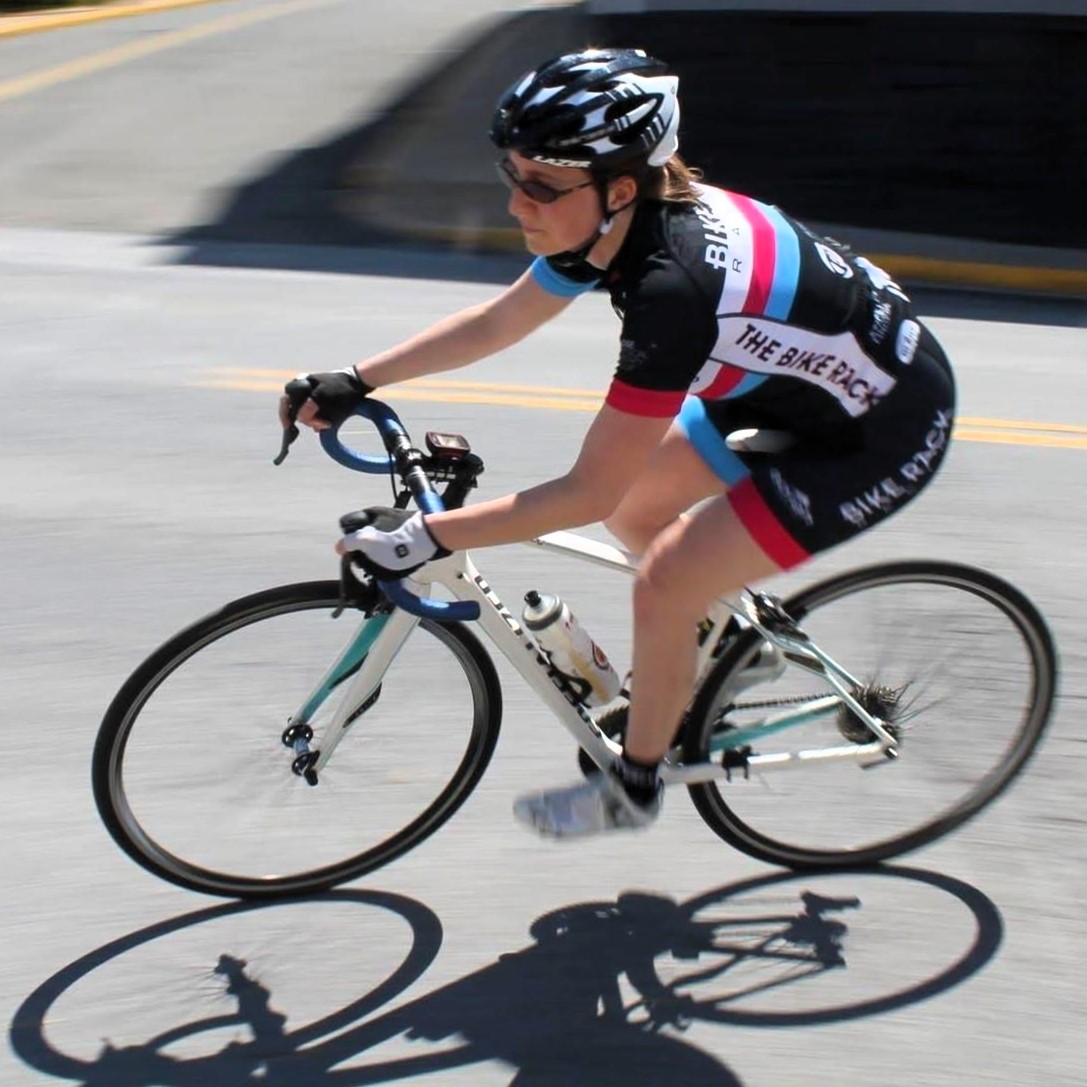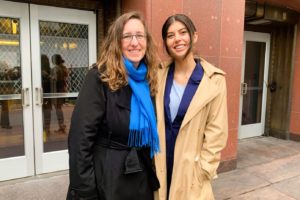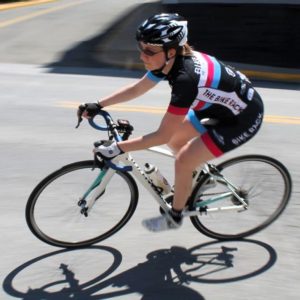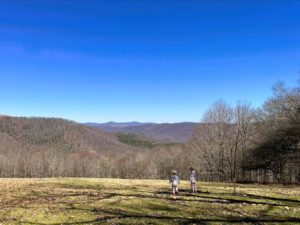
Meet Leah Nicholls
“It’s kind of can’t stop won’t stop, and sometimes, everything’s on fire. But I wouldn’t trade it.”
Meet Leah Nicholls, the Director of our Access to Justice Project. Since she joined Public Justice as a Kazan-Budd Attorney in 2012, Leah has litigated numerous cases involving access to courts, court secrecy, and consumer and worker protections. She is also a parent of two young children, a former bike racer, and legal storyteller.
Leah recently sat down with our Membership Manager Nikki Duffney to share how she found her way to this work, her favorite case, the advice she gives to new attorneys, and what she likes to do for fun.
Nikki: How did you get into the Access to Justice practice area of work that you do here now at public justice?
Leah: So, I always knew I was going to do public interest work. That’s why I went to law school in the first place, and other than a clerkship, it’s everything that I’ve done.

Leah Nicholls and Public Justice’s former Justice Catalyst Fellow Anita Yandle.
And the reason that I got into these access to justice issues is because I realized that the thing that really pissed me off is that we have some great laws on the books, but it doesn’t matter if you can’t actually get those laws enforced in court. And so, there are all of these increasing barriers to getting to the merits of a claim.
And when I was in law school and first starting out as a lawyer, one of the things that the Supreme Court was actively doing was narrowing Article III standing, and they’re still working on that project. But I kept seeing these new standing decisions coming out that just made it harder and harder for people to enforce the laws that we have. And so that’s what got me interested in this work. And I think it also really marries my nerdy legal side in addition to my public interest side, so it’s been a good fit for me.
Following on that question, was there a case, or an issue or maybe a moment in time where you first recognized that people weren’t getting their day in court before you were in law school? Or was that something that really was brought to light in school?
It was really in school and probably slightly after. I didn’t come from a family of lawyers. Reading Supreme Court decisions wasn’t something I did before a law school or anything like that. So, it really didn’t come to my attention until I got into law school.
Education is such a beautiful journey, and it also can be the thing that lights the fire, right?
Yeah, the more that I learn and the older I get, the more radicalized I become. I’m not someone who’s going to become more conservative or defensive of the system as I get older. The more time I spend in it and the more I learn, the more radicalized I get.
I love that for all of us.
What is the biggest challenge or reward that you experience in this work?
I think one of the biggest disappointments is when you work so hard for something, and you see that there’s an amazing opportunity to change the law in a positive way…and then it just disappears. Maybe for a good reason because the parties settled in a way that was really beneficial for the clients. Or maybe the defendant declared bankruptcy, ending the case for all practical purposes. Or maybe the case falls apart because it gets decided on a different issue. To have put in a ton of work and have a ton of hope for a particular outcome, good or bad, and then not even get there is a really disappointing feeling. It can be hard to remind yourself why we’re doing this when it could just all be for naught at the end of the day.
I think the biggest reward is when it does pay off. When you’ve put in all that work and you do get a really great decision, the thing that you set out to do actually happens. For example, you get what your client wanted and deserved, you fix the problematic precedent you set out to fix, or you make sure a certain type of case still gets to go forward—or a new type of case gets to go forward. And there’s so much about this process that we don’t have any control over, which can also be its own challenge, but being able to achieve what you set out to do and to get the decision that you were hoping you were going to get is an amazing reward. And I wish it happened more often.
A number of arbitration doctrines are ready to fall. And I’m really looking forward to litigating those.
Do you have any specific cases that stands out the most in your career?
Yeah, at least at this point, the one that to me really stands out is our Morgan vs. Sundance case that I worked on with my then-colleague, Karla Gilbride. We got that decision in the US Supreme Court, and we got a better decision than we were hoping to get. I wouldn’t say it was beyond our wildest dreams, but it was in keeping with our wildest dreams. We went back and forth a lot on how far we wanted to push the court to say something like, there is no policy favoring arbitration, in the sense that we don’t treat arbitration contracts better than other contracts. Is that something we can really ask the court to do? Or is that too big of an ask? And then the court went there. And I think to me, even more than just winning that case, was to get them to say that there’s no policy favoring arbitration. It was our wildest dreams of what that case could do. The case couldn’t have been any better. Because of what the Supreme Court said, a number of arbitration doctrines are ready to fall. And I’m really looking forward to litigating those. There are other things earlier in my career that have also been great, but that’s a relatively recent one that really stands out. I love that case.

A former bike racer, Leah’s ideal day still includes a bike ride.
What is your go-to leisure activity when you’re not working?
Well, I have two small kids who are two and five, so I don’t have a ton of time to myself. But I do really enjoy reading novels. I used to race bikes, so if I can manage it, I like to get a bike ride in, or a ride on the trainer. And I also like to watch bike racing. I think a day just by myself would be going for a bike ride, sitting in a park, and reading a novel with a latte. Those are the things that I would really love to do to wind down. Of course, family time is fun and rewarding too. But it’s rarely relaxing.
Did you ever get to go and participate in Critical Mass?
I don’t know that I did critical mass. I may have done it, maybe like once. I have done a bunch of cool group rides, like the rides organized by the Washington Area Bicyclist Association. And there used to be a Wednesday night ride called Downtown Breakaway, which was really fun, a huge group of people would get off work downtown and then ride out into the suburbs. So, I’ve participated in things like that.
What movements have the Access to Justice project connected with?
I think the movements that we have plugged into the most have been labor organizing movements. Because often what you have are workers who are misclassified, as independent contractors or gig workers instead of employees. And when they’re misclassified, they can’t unionize. Challenging misclassification is one of the first steps to union organizing. And then the organizers run into something like an arbitration agreement along the way. Our Supreme Court case, New Prime v. Oliveira, that case was as a result of being involved with the movement to organize truck drivers. We’ve also done cases on behalf of workers during COVID. And so, the labor movement is probably the movement that we’ve been the most involved in.
If you could change anything about the US judicial or legislative branch, what would you change and why?
I’m not sure if this is my number one thing, but I do think that some Supreme Court reform would be really useful, either though term limits or expanding the court in some way. What we have now on the Court are people who are incredibly activist. I think there’s this old school narrative that big C conservative judges, meaning those associated with the Republican party, are not the activists, and the only activist judges are liberals associated with the Democratic party. That’s just not true right now. We’re seeing a lot of Republican-affiliated or big C conservative judges who are changing the law in really dramatic ways. I mostly view these changes as not great for the people who live in this country, or for our institutions. And the Supreme Court has really been leading that charge. And in a lot of ways the Conservative movement has been really effective at appointing young justices to the Supreme Court, and they’re going to be there for a long time.
Your brief should tell a compelling story, even though some people may think it's about boring topics.
Do you have one skill that you’d like to sharpen or develop this year?
I’m going to pick two, if that’s okay. I think management and time management. Because I want our team to be as absolutely as effective as it can possibly be. So, I’m thinking about ways that we can bring out the absolute best of everybody on our team. And being really efficient, not in a production line kind of way, but in a way that uses our resources effectively, so people don’t get burned out and they have time for themselves, and they can keep doing this work effectively for a long time to come.
Do you have best piece of career advice that you’ve ever received? And would you adapt or change it for young attorneys or law students?
One of the best pieces of advice that I got about writing is to tell a story. One tendency that I see from young attorneys and law students is to write the fact section of a brief in a very staid, pure, just-the-facts kind of way. But that’s a lost opportunity. You should see writing a brief as being a storyteller. You want people to enjoy reading your brief, even though some people may think it’s about boring topics. It should tell a compelling story. Keeping that in mind when you’re writing is one of the better pieces of law-specific advice that I’ve gotten that I pass on to attorneys. Sometimes while I’m talking with a student or young lawyer about a brief, I’ll ask them to tell me the story you want to tell the reader about the case. And when they do, I can say, now write that down, what you just told me goes in the brief. And that storytelling can really bring legal writing to the next level.
Appellate briefs are very structured, and one of the first things is always the fact section. If you are an effective storyteller in your facts section—even if it’s a story about a statute or data or regulations—the reader should think you win by the time they finish that section.
And you haven’t even gotten to your legal argument.
Well, you mentioned earlier that you love to read novels, what was the last book that you read?
I’ll say the last book I read was actually not that great. I read it for my book club. So, I’m not going to discuss that one. Right now, I’m reading Ann Patchett’s Bel Canto.

Enjoying the outdoors.
What would be the theme song of your life right now, if you have one?
“All Star” by Smash Mouth. In particular, I’m thinking of the lines “Well, the years start coming and they don’t stop coming” and “My world’s on fire, how about yours? That’s the way I like it and I never get bored.” I’ve got, you know, a demanding job in a good way, plus having, you know, two small kids to take care of, I think it definitely can feel relentless at times. It’s kind of can’t stop won’t stop and sometimes, everything’s on fire. But I’d wouldn’t trade it.

